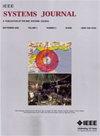Consensus for Nonlinear Multiagent Systems via Hybrid Event-Triggered Mechanism
IF 4.4
3区 计算机科学
Q1 COMPUTER SCIENCE, INFORMATION SYSTEMS
引用次数: 0
Abstract
This article addresses the leader-following consensus problem for a class of nonlinear multiagent systems under the event-triggered mechanism. Prior to control design, the topology hierarchical decomposition method is employed to simplify and layer the system topology, thereby reducing the complexity of topology and the communication burden of each agent. For each agent, a novel distributed observer is proposed under the event-triggered mechanism to estimate other agents' states, eliminating the necessity for real-time information from other agents. In addition, the hybrid dynamic event-triggered mechanism is developed, which can reduce the frequency of communication between agents. Furthermore, a leader-following consensus protocol is constructed under the proposed event-triggered mechanism to ensure that all followers will track the trajectory of the leader. Moreover, the protocol is updated discontinuously, reducing computation costs for the systems. An example is provided to verify the effectiveness of the proposed control algorithm.基于混合事件触发机制的非线性多智能体系统的一致性
本文研究了一类非线性多智能体系统在事件触发机制下的领导-跟随共识问题。在控制设计之前,采用拓扑分层分解的方法对系统拓扑进行简化和分层,从而降低了拓扑的复杂性和各agent之间的通信负担。对于每个智能体,在事件触发机制下提出了一个新的分布式观测器来估计其他智能体的状态,从而消除了对其他智能体实时信息的依赖。此外,开发了混合动态事件触发机制,降低了agent之间的通信频率。此外,在事件触发机制的基础上,构建了领导者跟随共识协议,以确保所有追随者都能跟踪领导者的轨迹。此外,该协议是不连续更新的,减少了系统的计算成本。通过算例验证了所提控制算法的有效性。
本文章由计算机程序翻译,如有差异,请以英文原文为准。
求助全文
约1分钟内获得全文
求助全文
来源期刊

IEEE Systems Journal
工程技术-电信学
CiteScore
9.80
自引率
6.80%
发文量
572
审稿时长
4.9 months
期刊介绍:
This publication provides a systems-level, focused forum for application-oriented manuscripts that address complex systems and system-of-systems of national and global significance. It intends to encourage and facilitate cooperation and interaction among IEEE Societies with systems-level and systems engineering interest, and to attract non-IEEE contributors and readers from around the globe. Our IEEE Systems Council job is to address issues in new ways that are not solvable in the domains of the existing IEEE or other societies or global organizations. These problems do not fit within traditional hierarchical boundaries. For example, disaster response such as that triggered by Hurricane Katrina, tsunamis, or current volcanic eruptions is not solvable by pure engineering solutions. We need to think about changing and enlarging the paradigm to include systems issues.
 求助内容:
求助内容: 应助结果提醒方式:
应助结果提醒方式:


